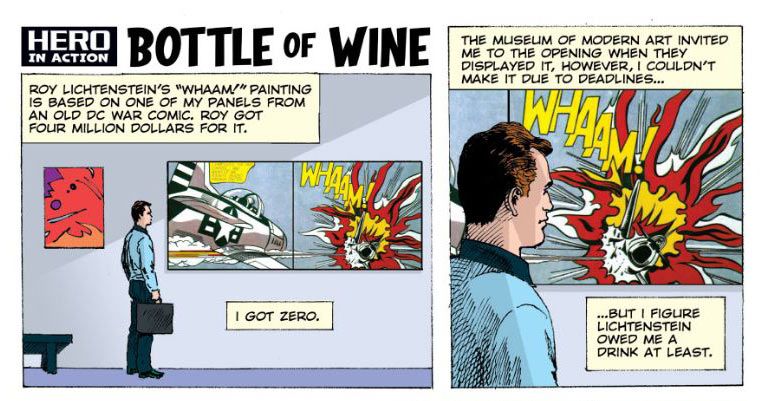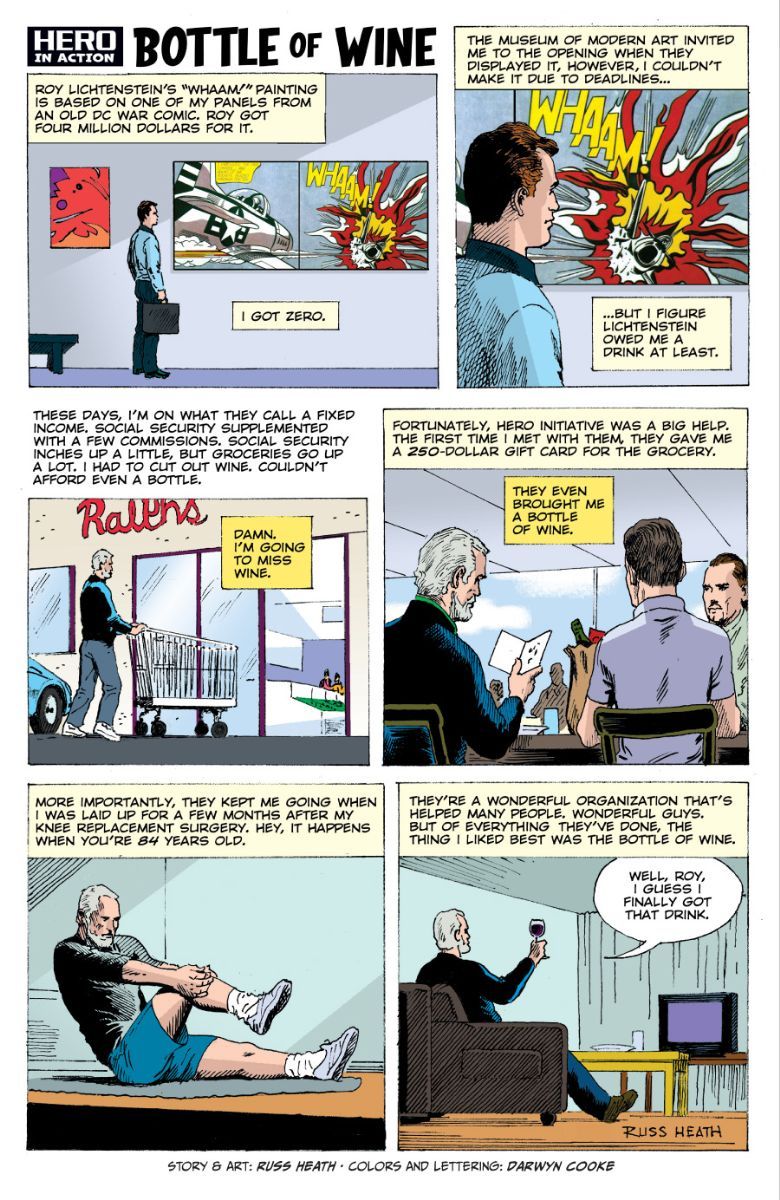"I don't need any help," he tells me as he sits down for lunch and grabs his menu. "Except for maybe with that girl over there." Russ pauses while I look around. "Just kidding. There's no girl. I wouldn't need your help if there was."
I'm having lunch with Russ Heath at his favorite British pub in Burbank. Russ is the 88-year-old legendary comics artist best known for his work on DC Comics' westerns, war titles and Sea Devils stories; Playboy's "Little Annie Fanny" and for an ad selling Roman toy soldiers that saw print in virtually every comic in the '70s and '80s. His work has been recently collected in IDW Publishing's "Flesh & Steel: The Art of Russ Heath."
RELATED: LIVING LEGEND: Why You Should Know the Work of Russ Heath
He's also known as one of a number of artists whose work was appropriated by pop artist Roy Lichtenstein. Thanks to The Hero Initiative, I'm one of a handful of volunteers that help Russ get around. The Hero Initiative, a charity dedicated to assisting comic book veterans in need, picks up Russ' lunch and grocery tab.
Russ wrote and drew a one-page comic published in 2012, detailing his Lichtenstein experience. Long story short: Lichtenstein took panels from comics drawn by Russ and other comic book artists and turned them into famous and lucrative pop art paintings with no compensation or payment issued to the original artists. Russ saw nothing while Lichtenstein pocketed millions. "[Lichtenstein] never even bought me a drink," Russ matter-of-factly told me.
I often forget Russ is 88. His laugh and wit are sharp and quick. The stories and recollections come rapidly, though with the disclaimer that he only remembers "the important stuff."
I've started taking Russ to lunch, running errands with him and driving him to the grocery store. I'm allowed the unique pleasure of hearing Russ' work stories, recollections, and jokes -- many of which would be at home on a Redd Foxx record.
"Do you know the difference between a hormone and pill? You can't hear a pill." Russ looks around the pub to see if anyone else heard. And I can tell he'd be pleased if anyone did.
Russ starts naming his favorite works. "I liked that one I did, the tank drawing." He's referring to a beautifully detailed double-page spread of a tank from issue 244 of "Our Army At War." "The gladiator ad. I wish I had a dime for every time that thing got printed. And 'Fanny.' Some of those were good."
He tells me about his days working out of the Chicago offices of Playboy and his days working on the "Little Annie Fanny" strip with Harvey Kurtzman. "We all took different pieces of it. I'd take a panel; someone else would take one. Or I'd redraw a leg for someone. It's not like it's done today. We just took sections." He notes he and Playboy founder Hugh Hefner are "the only two guys still around from those days. But our houses are a little different."
Russ gave up driving. Los Angeles is a hard enough city to navigate without a car. It's near impossible for a slower-moving man of 88.
Russ uses our grocery cart as a makeshift walker. He lumbers along slowly. A short walk takes a quick toll on his knees and back. We stop in front of the juice aisle so he can catch his breath. Russ turns to me with a confused look. "Why are we stopping here?" I point out he had juice on his grocery list. Russ laughs while he shakes his head, then moves on to another aisle. "This is juice," he says as he points to a shelf full of liquor.
Back at his apartment, Russ asks me if I'd like to see some of his work. He steadily makes his way around the multiple stacks of drawings and paintings in various stages of completion and pulls out a few. He shows me some recent commissions he's started. Every piece is just as detailed and amazing as his earlier comics work. He hasn't missed a beat. I take a moment to realize how rare an opportunity I have been afforded and thank him.
I decide to press my luck and run through a list of artist and writers and ask if he knew them. Robert Kanigher. Jack Kirby. Stan Lee. Will Eisner.
"Eisner," Russ repeats. "Only met him once at the [DC Comics office]. But someone asked him if there were any illustrators he thought were good. He said that there were two. ''Russ Heath and some other guy.'"
"Who's the other guy?"
"I don't know. He likes Russ Heath," Russ says with a wink. "I only remember the important stuff."
To learn more about the Hero Initiative visit www.heroinitiative.org.
David M. Gutierrez is a Los Angeles-based artist, writer, and co-hosts a podcast on the Ultraverse Network. Follow him on twitter at: @dmgutierrez


